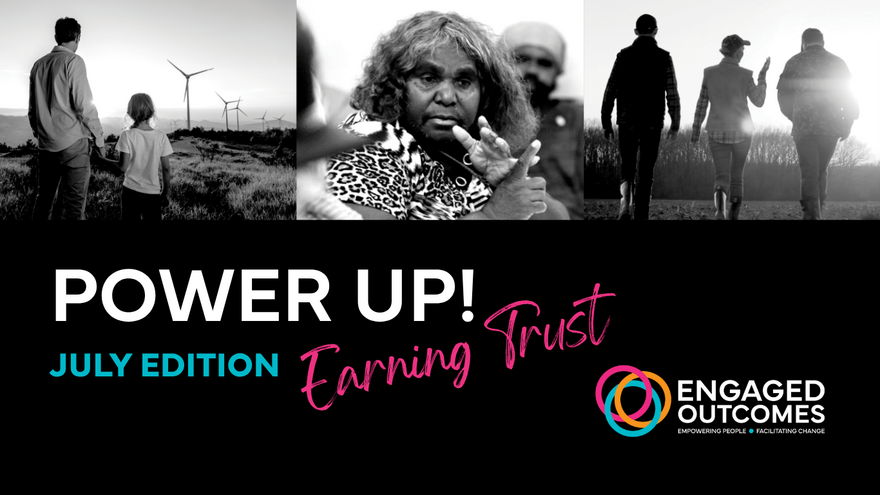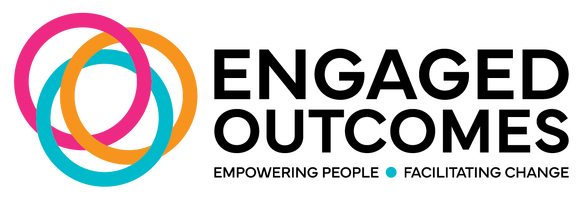
Note from Wendy
Hello there!
Happy EOFY! I hope you have had a chance to reflect, celebrate the wins from FY25, learn from the 'bumps' and have an exciting 12 months mapped out ahead of you. We certainly do and I can't wait to share more with you over the next few months!
We have been reflecting on earning trust last month across several of our pieces of work... so we thought we'd 'team with the theme' (as Kath and Kim would say) and make it the theme for this months newsy.
Let's talk about trust!
As we all know, in the context of the energy shift, trust and social licence are terms we hear a lot. They come up often but how do they play out on the ground?
The pace and scale of change across regional communities is creating deep uncertainty, and uncertainty demands trust. Trust in people. Trust in processes. Trust in promises.
Social licence and trust are deeply intertwined, because earning trust is the first step toward earning social licence. This was clearly evidenced in the research and engagement that shaped the Energy Charter’s Social Licence to Operate model . Their model recognises that social licence, like trust, isn’t a fixed, it’s dynamic. It must be earned and sustained through consistent, respectful, and transparent engagement.
As Jo Sheppard (CEO, QFF) is fond of saying "trust comes in on a donkey, and leaves on a ferrari" and social license is the same.
Louise Pogmore from KPMG would probably also add that “trust might relate to industry at a broad level, but social licence is earnt or lost at the local project level.”
Put simply - no trust, no social licence. They are deeply interwoven and right now, both are under pressure. The 2025 Edelman Trust Barometer ranked energy as the second least trusted sector in Australia (2025 Edelman Trust Barometer_Australia Report.pdf) and the 2024 Dyer Report (link in newsletter body) found that 92% of landholders and community members were dissatisfied with how project engagement was being done.
But here’s the thing - building trust, and supporting your project to earn social licence, isn’t abstract. It’s personal….and it’s built (or lost) one interaction at a time.
I often come back to the work of Stephen M.R. Covey, who offers two tools that are especially useful in this context:
- His Circle of Influence model reminds us that while there’s plenty we can’t control, we always have agency in how we show up. (Reducing Fear and Anxiety in Times of Uncertainty | FranklinCovey)
- His Trust Model tells us that trust is built through character and competence. (The 4 Essential Roles of Leadership® | FranklinCovey)
Both are simple, powerful frameworks that can support your practice (and your self care) and are well worth a look.
What do we hear in the regions?
In our work across regional Australia, people often say that building trust comes down to one simple idea: “just be a good human.” What they’re asking for closely reflects Covey’s model of trust, based on character and competence. They want:
- Honesty and integrity
- Early, clear communication
- Respect for their time, knowledge, and experience
- Genuine curiosity and interest in their business and community
- Follow-through and consistency
- People who know their role—and do it well
Simple? Maybe.
Easy? Not always.
But the good news? It’s in our control.
Every interaction is a chance to build trust. To show character. To demonstrate competence. And that’s the work.
Want to explore ‘earning trust’ a little more?
This month’s ‘From the Field’ reflection is from Dr Richard Parsons, whose work on trust, change, and the energy transition is shaping national conversations.
👉 Click here to read his piece or scroll down to find it below.
Missed PowerHour 2?
“Rethinking Renewables & Earning Trust” brought together three very different voices, practical insights, and lived experience.
👉 Watch it here – well worth your time.
At Engaged Outcomes, we help people build these trust-based capabilities through expert-led training, purposeful facilitation, and real conversations that lead to lasting relationships. Our approach is co-designed with rural voices—from industry, agriculture, community, business, and government—so it’s grounded in lived experience, not assumptions.
If your team is navigating complexity and wants to do engagement differently, let’s talk.
Enjoy the rest of the newsy, and reach out with your ideas and suggestions! Until next month,
Regards,
Wendy
Voices from the regions
Chris Sounness“Regional leadership starts with understanding what’s shifting under the surface and backing others to lead from where they are.” This month we are shining a light on Chris Sounnes - the CEO of Wimmera Southern Mallee Development. Chris brings decades of experience across agriculture, regional systems, and leadership to his role at WSMD. Raised on a sheep and wheat farm in Borden, WA, Chris developed an early fascination with the mechanics of farming and the power of community life. His career has spanned from hands-on agricultural work to leading innovation in extension and systems thinking, including notable roles with the Department of Agriculture and Birchip Cropping Group. Chris moved to Horsham in 1992, where he’s become deeply embedded in local life. His work has focused on connecting research, communities, and policy to support regional resilience and adaptation—especially as the Wimmera faces unprecedented land-use change driven by energy infrastructure, farm consolidation, and resource projects. Chris is known for his strategic, practical approach—driven by a belief that regional Australia is a national asset, not a charity case. He currently contributes to regional education, leadership, and soil research boards. A natural systems thinker and science communicator, Chris brings curiosity, fairness, courage and a long-game mindset to his leadership. Chris is the keynote speaker in our upcoming PowerHour episode: "Rethinking Renewables + Regional Collaboration" |
|
|
Earning Trust + Social Outcomes
|
From the Field: Dr Richard Parsons The energy transition is all about change - change in how we produce and distribute energy, change to our landscapes, and change for people. Change raises both hopes and fears, but mostly it brings uncertainty. And when faced with uncertainty, if we are to make decisions about our futures, we need to be able to trust the information we receive and the people we are dealing with. Trust is therefore critical for good outcomes. Trust is the conversational lubricant that means we can work together with common goals and mutual respect. Engagement practitioners can help to build trust by:
Dr Richard Parsons is a Brisbane-based independent social researcher who has worked on over 100 projects in multiple sectors, focusing on social impact assessment and community participation. Richard also writes extensively for professional and academic publications, and actively participates in industry and practitioner events. Richard recently gave evidence to the NSW Parliamentary Inquiry on the impact of Renewable Energy Zones on rural and regional communities. (His session starts at 3 hours 59 mins, and goes for 30 minutes) |
|
|
EmPOWER Podcast
Our emPOWER podcast series provides practical skills and insights to inspire action, better understanding of stakeholders and improved outcomes for people engaging across regional Australia.
EmPOWER is proudly supported by The Energy Charter, a CEO collaboration across the energy sector nationally, delivering better outcomes for customers and communities in the energy transition.
|
|
|
🎙️Episode 19: A Fair, Coordinated, and Community-First Transition This episode features Tony Mahar, Australian Energy Infrastructure Commissioner, in conversation with Wendy Agar about how to deliver a fair and coordinated energy transition that genuinely benefits regional communities. Drawing on Tony’s experience in agriculture and regional advocacy, they explore the current policy landscape, why engagement often falls short, and how to shift from compliance to accountability. The discussion highlights the importance of authentic leadership, community trust, and practical steps to improve outcomes for all Australians involved in energy, infrastructure, or regional development. |
|
|
|
🎙️Episode 20: Exploring Agrivoltaics In this episode, Wendy Agar talks with Karin Stark and Andrew Bomm about how agriculture and solar energy can successfully coexist through agrivoltaics. They explore the opportunities and challenges of dual land use, drawing on their experience and the insights from their Pursuing an Agrivoltaics Future report. The conversation covers how shared solar grazing can benefit farmers, improve land management, and build trust, while also addressing key barriers to adoption in Australia. This episode offers practical takeaways for anyone interested in energy, agriculture, or the future of land use in regional Australia. |
Catch up on our latest episodes here.
PowerHour Virtual Forum
|
|
|
In this months PowerHour episode, attendees joined an insightful and engaging forum featuring leading voices in regional engagement, where we explored what it truly takes to build trust in our communities. From expert practitioners to those living and working on the land, the session brought together a diverse lineup of perspectives to examine how strong relationships and meaningful collaboration can drive better outcomes for all. The virtual forum opened with keynote speaker Kieren Moffat (CEO, Voconiq), who shared compelling research and real-world examples on the foundations of trust, offering a deeper understanding of why trust remains the cornerstone of successful regional engagement. Ian Hayllor (Director, Graincott Farming Co) provided grounded insight into his lived experience of trust building as a landholder with CSG development, while Elliot Willemsen-Bell (Senior Manager - Community, Windlab) outlined practical strategies for building and maintaining long-term community connections. One key message resonated throughout: in regional development, there’s one golden rule—no trust, no progress. You can watch the recording and catch up on past episodes here. Register now for our next PowerHour Episode on 17 July: "Rethinking Renewables + Regional Collaboration" Thank you to our proud partners of the PowerHour 2025 series - Powerlink and Windlab. |
Fuel for Thought: Big Ideas, Local Impact
Have you read the Dyer Report yet? (officially known as the Community Engagement Review: Report to the Minister for Climate Change and Energy)
As mentioned in Tony Mahar's podcast episode, the Dyer Report highlights widespread community dissatisfaction with renewable energy developers' poor engagement practices, which are causing distrust and significant psychosocial impacts in regional communities navigating rapid energy transition.
The recommendations, when implemented or completed, are designed to achieve ongoing excellence in community engagement and, more broadly, excellence in the execution of the energy transition - check it out.






